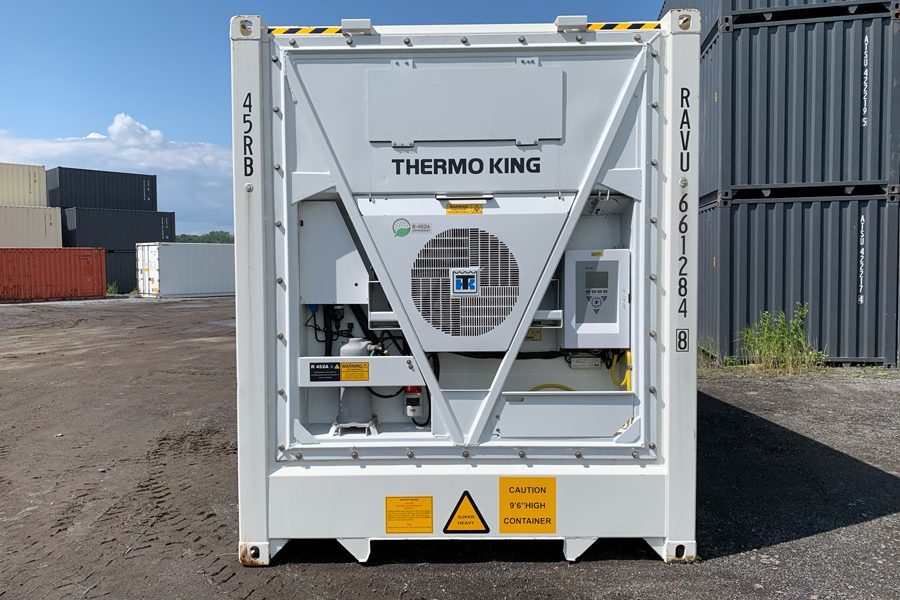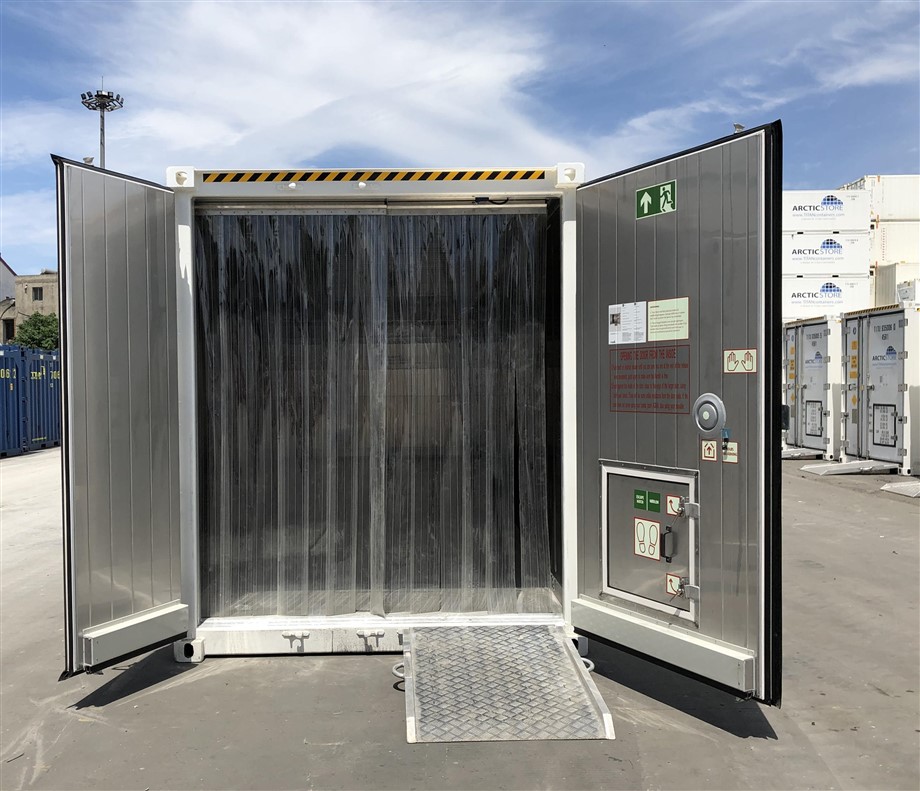Used 40ft refrigerated containers designed for commercial storage needs
Everything About Cold Storage Space Containers: Essential Insights for Your Storage Space Demands
Freezer containers play a crucial function in the conservation of perishable goods. They come in different forms, including cooled and protected systems, each designed for certain storage needs. Recognizing the benefits and vital attributes of these containers is vital for organizations aiming to enhance their procedures. As the need for reliable storage services grows, discovering the various alternatives readily available can bring about informed decisions that influence both productivity and sustainability. What elements should one consider when selecting the ideal container?
Sorts Of Freezer Containers
Cold storage space containers can be found in numerous kinds, each designed to satisfy certain temperature level control requirements. Among the most usual types are chilled containers, which preserve temperature levels in between 0 ° C to 10 ° C, making them suitable for perishable goods like fruits, veggies, and dairy items. Another kind is the deep freezer container, which operates at temperature levels listed below -18 ° C, ideal for lasting storage of icy products such as meats and fish and shellfish.
Shielded containers provide temperature level security without energetic cooling, making them helpful for temporary transport of temperature-sensitive products. Additionally, there are portable cold storage devices, which supply adaptability in areas and are frequently used in events or seasonal operations. Finally, blast chillers quickly lower the temperature of hot foods, making certain security and high quality. Each type offers an one-of-a-kind purpose in different industries, from food service to drugs, emphasizing the importance of picking the ideal container for specific storage space demands.

Benefits of Making Use Of Freezer Solutions

Chilly storage space solutions expand the rack life of products, lowering waste and enhancing earnings for services. By efficiently managing supply with appropriate temperature level control, companies can maximize their supply chains and enhance functional performance.
Furthermore, cold store facilities enable for adaptable storage space choices, accommodating various quantity demands and seasonal fluctuations in need (used 40ft refrigerated shipping containers). This adaptability helps organizations respond promptly to market changes
Last but not least, employing cold store solutions can guarantee compliance with wellness and safety policies, guarding both organizations and customers. Generally, the critical use of freezer improves item administration while advertising sustainability and financial feasibility.
Secret Attributes to Look for in Freezer Containers
When choosing cool storage space containers, numerous key features advantage cautious factor to consider to safeguard peak efficiency and integrity. Temperature level control capacities are important; containers must keep regular temperature levels ideal for specific goods. Insulation high quality additionally plays a considerable role, as premium insulation lowers power intake and improves temperature level stability.
Next, convenience of accessibility and loading is critical; containers should offer straightforward designs for efficient handling and organization. Longevity is one more essential aspect; weather-resistant materials ensure long life and secure components against ecological factors.
Additionally, movement attributes, such as built-in wheels or lifting factors, assist in transportation, while personalized designs permit tailored storage space options.
Keeping track of systems, consisting of temperature level alarms and remote monitoring, give real-time updates, making specific that conditions remain excellent. By concentrating on these functions, users can select cold store containers that meet their functional needs successfully.
Selecting the Right Cold Storage Container for Your Demands
Selecting the right cold store container needs a thoughtful evaluation of operational requirements and specific needs. Aspects such as the sort of products being stored, temperature level level of sensitivity, and quantity ought to be focused on. Disposable food things may require containers with rigorous temperature controls, while drugs might need exact problems to maintain efficacy.
In addition, potential customers ought to take into consideration the container's size and mobility. A larger system might be needed for mass storage, while smaller sized, mobile options might be optimal for short-lived or on-site needs. Insulation top quality and energy efficiency are likewise important, as these will certainly affect operational costs and temperature security.
Last but not least, conformity with market guidelines and requirements is necessary, especially in markets like food and health care. By thoroughly examining these aspects, individuals can select a cold store container that properly fulfills their unique requirements and guarantees optimal storage conditions.
Best Practices for Maintaining Cold Storage Space Issues
Maintaining optimal freezer conditions is crucial for preserving the top quality and security of temperature-sensitive products. Routinely keeping track of temperature level and humidity degrees is vital; using reliable electronic thermometers and hygrometers can provide precise readings. Proper insulation of chilly storage space containers helps lessen temperature level fluctuations and power loss.
Applying a first-in, first-out (FIFO) system ensures that older supply is utilized before more recent stock, minimizing waste (used 40ft refrigerated shipping containers). In addition, preserving an organized design within the storage room enables much better air flow and decreases the risk of cross-contamination
Routine upkeep examine equipment, such as seals and compressors, are necessary to avoid malfunctions. Personnel training on ideal techniques for packing and dumping items helps maintain temperature stability. Lastly, maintaining doors shut as high as feasible limits heat exchange, ensuring that the cold store setting remains steady and reliable in preserving useful products.
Cost Considerations for Freezer Solutions
When reviewing freezer solutions, it is important to think about the first financial investment expenses together with ongoing functional costs. A thorough breakdown of these prices can expose significant lasting cost savings potential for businesses. Recognizing these monetary aspects helps stakeholders make educated decisions concerning their cool storage needs.

Initial Financial Investment Expenses
The monetary landscape of chilly storage space containers offers numerous first financial investment prices that organizations have to take into consideration. These prices usually consist of the acquisition or rental rate of the containers, which can differ based upon type, insulation, and size high quality. Furthermore, expenditures associated with retrofitting existing structures to accommodate cold store should be factored in, especially if specialized devices is needed. Setup expenses, consisting of electric job and refrigeration systems, additionally add to the general preliminary investment. Services must not neglect transportation prices for providing containers to their desired location. Lastly, potential customization alternatives, such as shelving or temperature monitoring systems, can further influence the first economic expense. Cautious budgeting for these aspects is crucial for effective cold storage application.
Operational Expenditures Malfunction
Operational expenses for cool storage options encompass a number of crucial price considerations that services must browse. Trick elements consist of power expenses, which can be significant due to the requirement to keep low temperature levels. Maintenance expenses are additionally considerable, as routine maintenance is necessary to ensure tools operates efficiently and continues to be certified with health and wellness requirements. Furthermore, labor costs might emerge from the need for specialized personnel to handle and monitor the storage setting. Insurance expenses are another consideration, as business need to shield their investments against prospective losses. Any potential regulative conformity costs should be factored in, as organizations might require to invest in systems that stick to food safety and security and environmental guidelines. Recognizing these expenditures is essential for reliable budgeting.
Long-Term Financial Savings Possible
Purchasing cold storage space remedies supplies substantial long-term here savings possibility, changing preliminary expenditures right into monetary effectiveness over time. By decreasing perishing and waste, services can enhance their profit margins substantially. Advanced insulation and energy-efficient systems minimize utility costs, which accumulate over the life-span of the equipment. Cold storage containers typically call for much less regular maintenance contrasted to standard refrigeration approaches, leading to reduced fixing expenses. The capability to store items for extensive periods without compromising high quality allows organizations to take advantage of on market variations, enhancing earnings. Additionally, the scalability of cold store services makes it possible for companies to adjust to transforming demands without sustaining excessive expenses. On the whole, these elements add to a compelling instance for chilly storage as a cost-effective financial investment approach.
Often Asked Inquiries
How Much Time Can Food Be Kept in Cold Storage Containers?
The period food can be stored in freezer containers varies by kind. Generally, subject to spoiling products last from days to weeks, while frozen foods can stay safe for months, depending on proper temperature level and storage problems.
Are Cold Store Containers Energy-saving?
The energy efficiency of chilly storage space containers differs based upon layout and insulation quality. Modern systems often use sophisticated modern technology to minimize energy usage, inevitably adding to reduced operational expenses and ecological impact in long-lasting usage.
Can Cold Store Containers Be Customized for Particular Demands?
Cold storage containers can certainly be personalized to satisfy details demands. Alterations might include temperature controls, dimension changes, and added features, enabling users to customize remedies effectively for numerous storage space demands and operational preferences.
What Are the Usual Dimensions of Freezer Containers?
Cold store containers usually are available in conventional sizes such as 10, 20, and 40 feet. These measurements fit different storage requirements, ensuring flexibility for organizations requiring temperature-controlled atmospheres for disposable items or delicate materials.
Do Freezer Containers Require Special Authorizations for Use?
Cold store containers usually call for unique licenses for usage, relying on local guidelines and meant applications. Authorities might mandate permits to assure safety criteria, ecological conformity, and proper functional practices are maintained during their application.
Cold storage space containers come in various kinds, each developed to meet particular temperature control demands. Additionally, cold storage centers allow for adaptable storage alternatives, suiting numerous quantity needs and seasonal variations in need. Choosing the right cold storage container calls for a thoughtful analysis of certain needs and operational needs. The financial landscape of chilly storage space containers presents different first investment prices that companies have to think about. Cold storage containers can indeed be personalized to satisfy specific requirements.